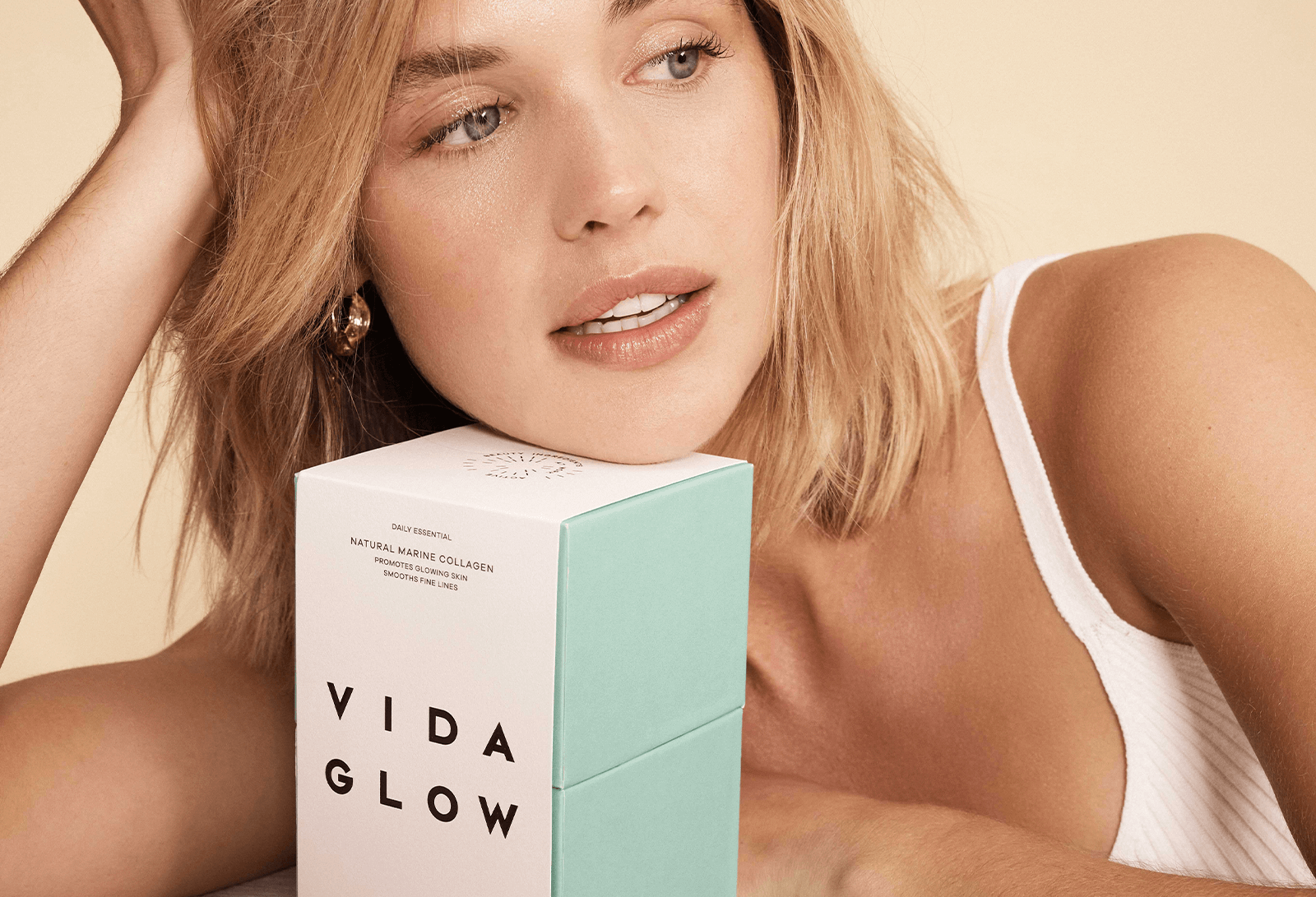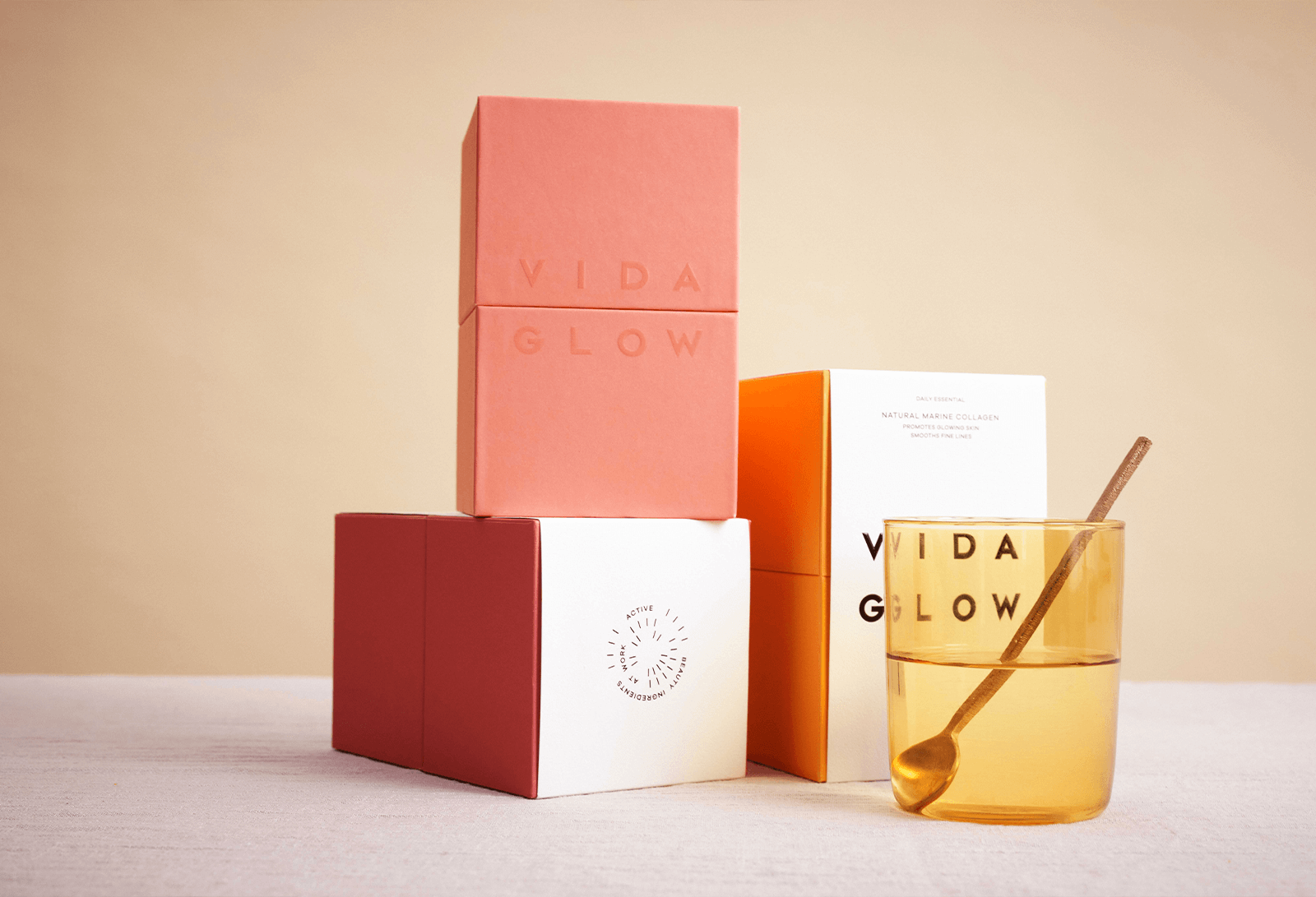Ingestible beauty solutions are proving to be a promising sector of the market. After all, investing in high-end skincare products can only go so far if lifestyle factors such as pollution, stress, nicotine/alcohol/processed food consumption, and excessive sun exposure cause oxidative stress to the epidermis. “I like to explain to people that the surface layer of skin, where most traditional skincare operates, makes up for only 3% of the complete skin organ. Ingestible beauty products start in the body, at a cellular level where the ingredients can penetrate the other 97% of skin. So, with ingestible beauty, you can address more of the skin, than just the superficial outer layers,” explains Anna Lahey, founder of Vida Glow.
Collagen―the very fiber of our hair, bones, and skin―is especially crucial when it comes to the body’s aging process. As it naturally reduces over time, so too does the firmness and smoothness of skin, as well as the strength of our muscles, strands, and nails. Therefore, it is unsurprising that there is a hot demand to boost this magical building block in any way possible―whether that be Tosla pivoting from food tech into liquid collagen or fashion designers like Buki creating wearable collagen collections.
In 2021, the global collagen supplements market was estimated at $1.99 billion, with a CAGR of 5.5% forecast for the next five years, while the nutricosmetics market overall is valued at $217 billion according to CB Insights. From investment perspectives, the main beauty conglomerates have been slower to hop onboard, with only Nestlé and Unilever making acquisitions. Nestlé Health Science acquired a majority stake in Vital Proteins, known for its Collagen Peptides supplement, while Unilever acquired holistic wellness company Onnit, as well as Liquid I.V. in a move towards entering the holistic supplementation space. It is uncertain why companies are slow to invest in this space given the profit promise, especially amidst ongoing holistic beauty trends. One reason might be the varying regulatory issues surrounding them.
In the UK and EU, beauty claims need to be “suitable evidence proving the efficacy of the product” such as clinical trials. When it comes to selling supplements in the US, manufacturers introducing these products need to register in accordance with the Bioterrorism Act. The FDA, while regulating the products and requiring adherence to GMP (Good Manufacturing Practice), does not require safety evidence unless it contains a new dietary ingredient. Even if a new ingredient is introduced, it is only tested for safety and not efficacy. Therefore it is not surprising that some consumers and industry members approach the category with a bit of skepticism.
Entering the market in 2014, Vida Glow was an early innovator in the category, and has managed to turn into an international success story despite these regulatory obstacles. Lahey was inspired to bring the results of marine collagen to the masses after discovering its benefits for her own hair loss issues while traveling overseas, “I invested into the research to understand the scientific evidence behind the results I saw across my hair, skin, and nails. And the clinical data was very evident. I knew I had to share this,” she recalls to BeautyMatter. She developed a marine collagen peptide powder, an ingredient not readily available in her home of Australia, sourced specifically from the discarded skin of sustainably raised fish to minimize environmental impact. Through hydrolization, or the breaking of chemical bonds through water, the collagen peptides within the fish skin are broken into smaller size particles, which boosts absorption and, with it, benefits for the body. Effects go beyond youthful skin, strong hair, and healthy nails, also promising better bone health and sleep improvement.
But relaying those impressive results to the industry and consumers came with a learning curve accompanied by countless hours in educational initiatives. “When we launched, ingestible beauty and collagen weren’t the beauty buzzwords they are today. Our biggest challenge back then was product awareness,” she explains. “After we launched, I would do anything I could to speak to people about the benefits of collagen and ingestible beauty. I spent my weekends at different stores standing at a tasting table in a denim apron with a Vida Glow sticker on it because we couldn’t afford to have it embroidered. I’d talk to any customer I could. People were very curious about a cellular and inside-out approach to beauty and once they tried our marine collagen and experienced the results first-hand, they were hooked. ”
Today, beauty supplements are a budding space, with ingredient efficacy proving to be a vital marker to stand above the competition. Having the science to back up its product claims and results is an integral part of Vida Glow’s success, increasing consumer confidence with a convenient and chic-looking product that delivers on its promise. “Everything we create is through a science lens but as a brand we like to show up as vibrant and bold. We want our consumers to be proud to have Vida Glow in their routine and homes,” Lahey explains.


As for the development of the sector overall, the entrepreneur notes a desire for a greater intersection of wellness and science in the near future. “The notion of wellness has evolved in a way that can sometimes be perceived as fluffy or lacking credibility. Yet there are plenty of routines, products, and practices that are proven, scientifically or clinically, to have a true positive impact on our well-being,” she adds. “The more we see advocacy and adoption from doctors, qualified experts, and scientists, the more consumers trust in the efficacy. Hearing the benefit of ingestible beauty from a professional has more potency than hearing it from a brand.” Vida Glow employs a team of skin professionals in the creation of its products: medical and cosmetic doctor Dr. Ewoma Ukeleghe, skincare scientist Dr. Michele Squire, beauty therapist Jocelyn Petroni, and dietitian Chloe McLeod.
On its website, the company offers an extensive look into the how’s, why’s, and what’s of marine collagen for consumer education, with an emphasis on independent research to ensure product claims. In double-blinded, placebo-controlled, randomized clinical trials conducted over 12 weeks, of 57 mature women who ingested fish collagen peptides with/without silicon, 70% saw an improvement in crow’s feet, 68% saw a boost in hydration, and 60% saw a reduction in wrinkles around the mouth area. Once ingested, the marine collagen works by feeding the skin essential amino acids to stimulate its own collagen production, or more specifically the fibroblasts that help build collagen, with the first results visible in four weeks.
Vida Glow explains that marine collagen is 1.5 times more bioavailable than cow or pig collagen, further boosting efficacy. The company’s own marine collagen powder shows an absorption rate of over 90%, and also goes through 300 safety tests and quality checks, including fourfold purification to ensure safety for human consumption. Single-use sachets also provide a convenient format for consumers, eschewing bulky supplement bottles, with one unit providing three grams of collagen (.5 above the minimum amount needed to produce the results listed above). “We ensure our products are bioavailable by formulating with ingredients at active doses that have robust scientific evidence to support their impact on the concerns we’re targeting. We are also sure to use the best format—be that a powder or capsule—to deliver these ingredients effectively in the body,” Lahey comments. All products are developed and formulated at an in-house innovation lab before being clinically trialed at a research facility.
That effort pays off. The company states it is the #1 marine collagen brand worldwide and that one unit of its Natural Marine Collagen is sold every four seconds, making it a market leader. As for the fan bases purchasing the products, Lahey notes that the core Vida Glow customers are women 35 and older, but younger audiences are also purchasing the company’s products tailored towards acne-prone skin (Clear) and hair health (Hairology). In terms of regional differences, Lahey notes advanced category awareness in Australia and Asia, with more of an emergence phase currently happening in the US.
For Vida Glow, adapting its products to these regional nuances in regulations has been another challenge. “It creates so many barriers to entry. We’re in a place that we have been able to invest in a team that are experts in formulations and regulations so that we can eliminate this barrier and deliver science-backed ingestible beauty to US consumers,” she explains.
The company moved beyond ingestibles in 2022, launching its Age Defiance skincare line, which uses a trademarked hydrolyzed collagen derived from plankton’s exopolysaccharides and sea urchin called Lumiséa. In clinical trials conducted on the range of products, results included a visible reduction of crow’s feet after two weeks of use (for Age Defiance Eye Contour Cream), and visible wrinkle reduction in 30 minutes (Age Defiance Rapid Renewal Serum).
Ingredient innovation doesn’t just begin and end with collagen for the company: its Radiance Advanced Repair supplements contain SkinAx2, a combination of natural antioxidants like French melon extract, carotenoids, and champagne grape seed to revive dull skin. In clinical studies, the company found that two months of regular supplementation resulted in a 26% increase in luminosity; improvements of blemishes, dark circles, and age spots by 18%; and a brightening of under-eye circles by 12%. AnaGain, the active ingredient derived from organic pea sprout extract, and the hero ingredient of Vida Glow’s Hairology supplements, was shown to reduce hair loss by 34% after four weeks of supplementation, with 71% of participants seeing a boost in overall hair condition.
As consumers become more and more privy to the fact that what’s happening underneath, rather than on their skin, has a huge impact on optimal aging, the beauty supplement category is likely to see further entrants. Trust in product quality, safety, and efficacy remains paramount, and it is here where companies like Vida Glow—which have laid the extensive groundwork for ensuring their product benefits go beyond a promise and are instead a fact-based guarantee—will see extensive growth. The beauty consumer of tomorrow doesn’t want hope in a jar, but rather science in a sachet.